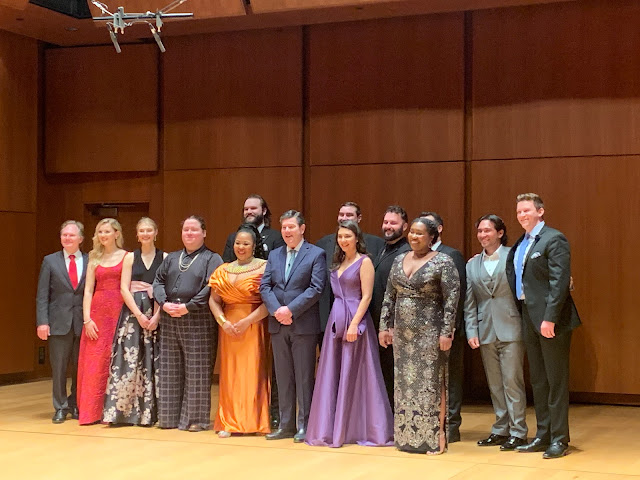Pianist Maestro Michael Fennelly, Foundation President John H. Hauser, and finalists in the 2023 Competition
The gracious presence of the late Nora London was greatly missed but we received a warm welcome from John H. Hauser, President of the George and Nora London Foundation. The prizes awarded in this competition are generous and the winners generally go on to great careers. The twelve finalists were of the very highest caliber and the judging must have been extremely difficult. We were glad not to have been among them! We love this competition because all finalists walk away with great honor as well as financial benefit.
If you must know which five of the twelve received the greatest honor, you must look on the foundation's website. We are sure it made a difference to the competitors but to our ears, they were all winners. There seemed to be more large voices this year and also a preponderance of sopranos and tenors with a lone mezzo-soprano, a sole bass-baritone, and a singular counter-tenor.
Regardless of who won the major prizes, several performances suited our taste to the point of lingering in our memory. That they just happen to be three beautiful young women "should" be considered irrelevant but it surely doesn't hurt one's career to be as appealing to the eye as to the ear.
Karoline Podolak put a smile on our face with a spirited performance of "Je suis Titania" from Ambroise Thomas' Mignon. There was charm and expressiveness in spades, utilized to underscore the fioritura which was cleanly delivered. It was altogether enchanting.
No less enchanting was the bright soprano of Erika Bakoff who performed "A vos jeux amis" from Thomas' Hamlet. It seems curious that we have heard very little of Thomas' works and here we got to hear two on the same program. We got to realize how well he writes for young light sopranos! Along with the lovely vocal line, we appreciated a terrific trill and a smoothly descending scale passage.
The role of Sophie in Strauss' Der Rosenkavalier must impress the audience in the same fashion as Sophie herself is impressed by the attention paid her by Count Rofrano as he delivers the silver rose. In this case, Elena Villalon succeeded in conveying innocence and wonder with a sweet coloration to the voice and the assumption of a modest demeanor. It was a completely convincing characterization.
We have been hearing quite a bit of "Aleko's Cavatina" from the Rachmaninoff opera that we have never seen in its entirety. Poor Aleko sings of his despair, his Gypsy wife having fallen for a young man of her own people. Somehow we were reminded of old King Philips's aria "Ella giammai m'amo" from Verdi's Don Carlo in which the singer must generate sympathy for a murderous man. At this task, bass-baritone William Socolof succeeded admirably with a carefully modulated performance, generous tone, and exemplary Russian.
Contrasting with the lowest voice in the competition was the highest male voice, that of counter-tenor Aryeh Nussbaum Cohen who performed "Inumano Fratel...Stille Amare" from Händel's Tolomeo in which the eponymous title character believes he has drunk poison and cannot make it through the da capo. Mr. Cohen dazzled with his mastery of this rare fach and it's vocal fireworks. If our opinion inspires you, you can hear his video for yourself on YouTube.
It is always interesting in a competition to be introduced to an aria with which one is unfamiliar but it is an entirely different story when a young singer tackles a very familiar aria. We feel the satisfaction one feels with the familiar but we are looking for something original or different in which the singer tells us something new about the character. Tenor Matthew Cairns took on "La fleur que tu m'avais jetée" from Bizet's Carmen and he did so with full tone and a lovely vocal quality. We particularly admired the dynamic variety and a smooth decrescendo.
Tenor Joseph Sacchi has a large powerful instrument just right for the role of Max in Weber's Die Freischütz. "Durch die Walder, durch die Auen" was performed in clearly enunciated German, augmented by meaningful gesture.
We always enjoy arias more when we understand the words and tenor Jordan Loyd delivered "Inutile regrets" from the final act of Berlioz' Les Troyens in fine French. He employed his fine vibrato to express Énée's despair in an emotional performance.
Another highly emotional performance was that of tenor Ricardo Garcia who put 110% into his portrayal of Lensky facing death in Tchaikovky's Eugene Onegin. The vocal line was lovely and the gestures were Russian in their extravagance.
The only mezzo-soprano on the program, Olivia Johnson gave an expressive performance of "O ma lyre immortelle" from Gounod's Sapho. (The program listed the composer as Massenet and indeed Massenet did write a piece of that name almost a half-century later but we are quite sure that what we heard was from the Gounod.)
The only Puccini aria on the program was from Edgar, about which we know little. Amber Monroe has a sizable soprano with an expressive vibrato put to good use in "Addio mio dolce Amore" sung by the faithful Fidelia.
Perhaps it was the stress of singing first but having heard tenor Alexander McKissic several times in the past, we didn't think we were hearing him at his best in "Se all'impero amici dei" from Mozart's La Clemenza di Tito, sung by the merciful titular character. He sounded best in the pianissimi passages with a lovely legato but as the volume increased his tone sounded rough which did not suit Tito's character. We found ourselves wishing he had not been first on the program.
Splendid accompanying in all these varied styles was provided by Maestro Michael Fennelly.
© meche kroop

No comments:
Post a Comment